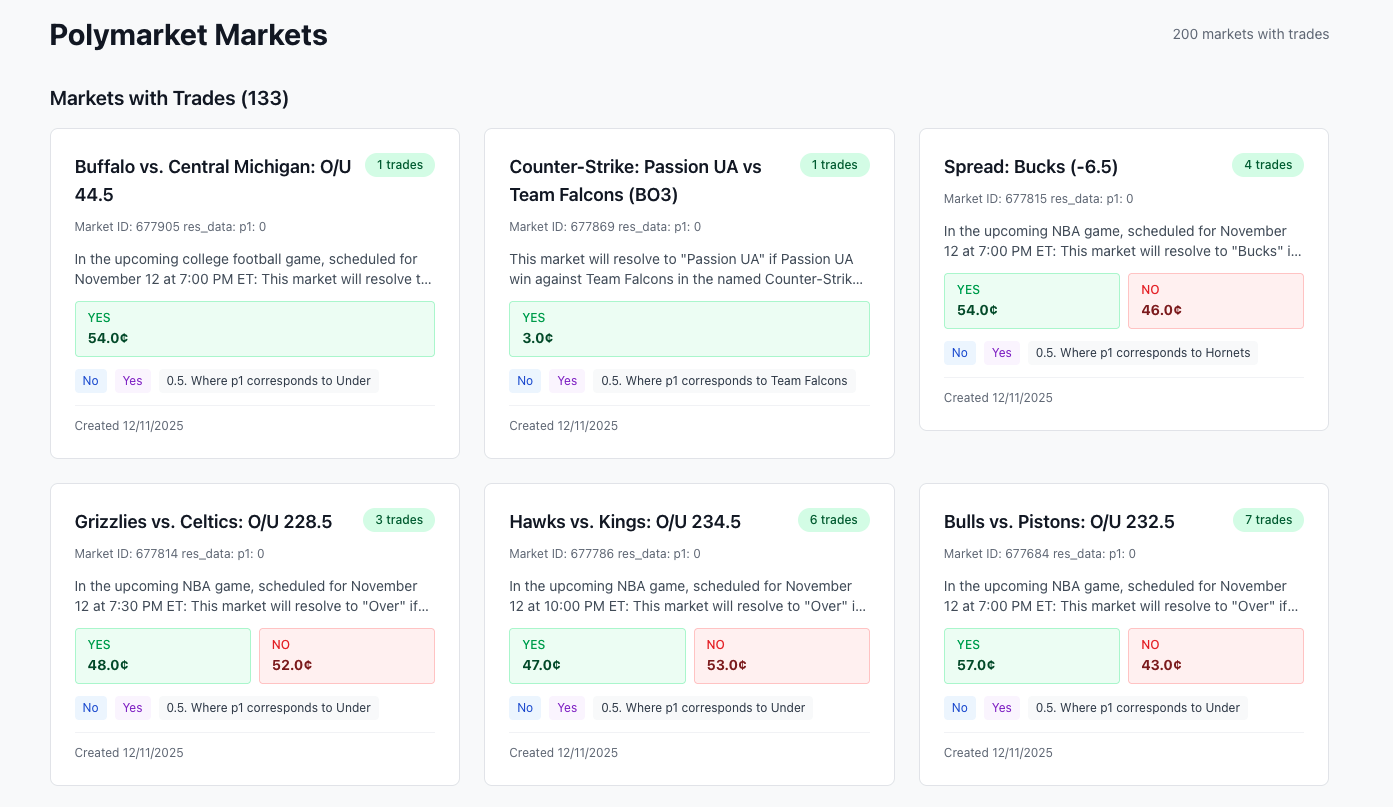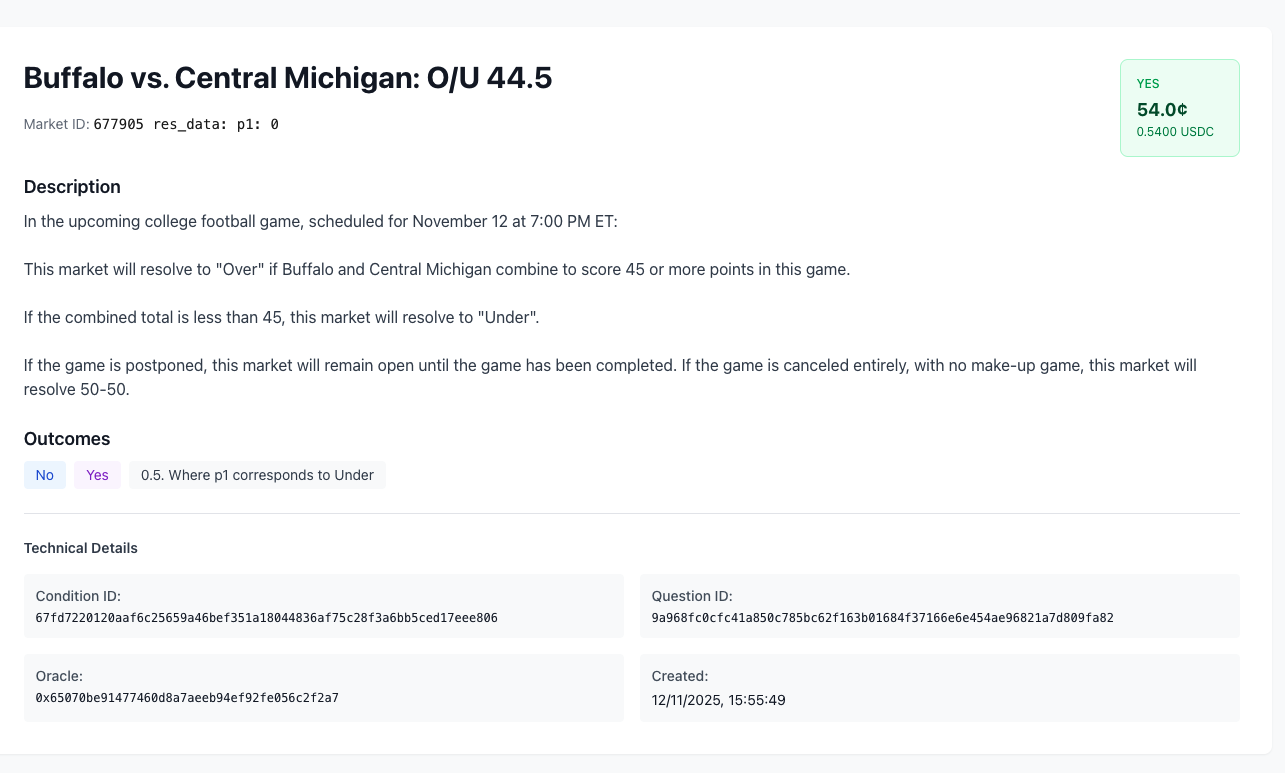Polymarket Data API - Build Prediction Market Apps in Minutes
Get real-time Polymarket data: prices, trades, markets, and oracle resolutions — all accessible through simple GraphQL queries on Polygon.
Quick Start: Get Polymarket Prices in 30 Seconds
Try it now: Open in Bitquery IDE → Paste query → Get instant results
Copy and paste this query to get the latest Polymarket trades with prices:
{
EVM(dataset: realtime, network: matic) {
Events(
orderBy: {descending: Block_Time}
where: {
Block: {Time: {since_relative: {hours_ago: 24}}}
Log: {Signature: {Name: {in: ["OrderFilled"]}}}
LogHeader: {
Address: {
in: [
"0xC5d563A36AE78145C45a50134d48A1215220f80a",
"0x4bFb41d5B3570DeFd03C39a9A4D8dE6Bd8B8982E"
]
}
}
}
limit: {count: 10}
) {
Block {
Time
Number
}
Transaction {
Hash
}
Arguments {
Name
Value {
... on EVM_ABI_BigInt_Value_Arg {
bigInteger
}
... on EVM_ABI_Address_Value_Arg {
address
}
}
}
}
}
}
What You Can Build
- Trading dashboards with real-time Polymarket prices
- Market discovery apps to find new prediction markets
- Analytics platforms tracking volume, liquidity, and trends
- Trading bots monitoring oracle resolutions and market movements
- Portfolio trackers for prediction market positions
Complete Guide: Get All Market Data
New to Polymarket APIs? Follow our step-by-step guide: How to Get All Data for a Specific Market — covers everything from market metadata to trades and token holders.
What is Polymarket API?
Polymarket API provides programmatic access to prediction market data through GraphQL queries. Query market information, trading activity, token holders, prices, and oracle resolution data directly from the Polygon blockchain.
What You Can Query
- Market prices — Real-time YES/NO prices from OrderFilled events
- Trading activity — All trades, order matches, and fills
- Market metadata — Titles, descriptions, outcomes (decoded from blockchain)
- Oracle resolutions — UMA oracle outcomes and dispute data
- Token holders — Who holds positions in each market
- Liquidity data — Position splits, merges, and collateral flows
Smart Contract Addresses
| Contract | Address | What It Does |
|---|---|---|
| Main Polymarket Contract | 0x4d97dcd97ec945f40cf65f87097ace5ea0476045 | Creates markets, mints/burns tokens, handles redemptions |
| CTF Exchange (Current) | 0xC5d563A36AE78145C45a50134d48A1215220f80a | Trading venue for outcome tokens (multi-outcome markets) |
| CTF Exchange (Legacy) | 0x4bFb41d5B3570DeFd03C39a9A4D8dE6Bd8B8982E | Legacy exchange for binary markets |
| UMA Adapter | 0x65070BE91477460D8A7AeEb94ef92fe056C2f2A7 | Connects Polymarket to UMA oracle for market resolution |
Common API Queries
- Get markets: Query
QuestionInitializedevents from UMA Adapter - Get prices: Query
OrderFilledevents from CTF Exchange - Get trades: Query
OrderFilledandOrderMatchedevents - Get condition ID: Query
ConditionPreparationevents from Main Contract - Decode market data: Decode
ancillaryDatafromQuestionInitializedevents
Real Example: Polymarket Dashboard
See it in action — a complete Next.js app built with these APIs:
 Real-time market list with prices and trade counts
Real-time market list with prices and trade counts
 Complete market view with metadata, prices, and technical details
Complete market view with metadata, prices, and technical details
What it does:
- Lists all Polymarket markets with live prices
- Shows trade history and token holders
- Decodes market metadata from blockchain
- Calculates prices from OrderFilled events
Tech stack: Next.js + TypeScript + Bitquery GraphQL APIs
CLI Tool: Polymarket Trade Tracker CLI — Built using Bitquery for inspecting OrderFilled events, tracking traders, and analyzing market data.
API Documentation by Contract
Choose the contract based on what data you need:
Main Polymarket Contract ��— Market Creation & Resolution
Use for: Creating markets, minting tokens, checking resolution status
Key Events:
ConditionPreparation— New markets createdPositionSplit— Tokens minted from collateralConditionResolution— Market resolved by oraclePayoutRedemption— Users claiming winnings
Address: 0x4d97dcd97ec945f40cf65f87097ace5ea0476045
CTF Exchange Contract — Trading & Prices
Use for: Getting prices, tracking trades, monitoring liquidity
Key Events:
OrderFilled— Individual trades (use for price calculation)OrderMatched— Order matching eventsTokenRegistered— New trading pairs created
Addresses:
- Current:
0xC5d563A36AE78145C45a50134d48A1215220f80a - Legacy:
0x4bFb41d5B3570DeFd03C39a9A4D8dE6Bd8B8982E
UMA Adapter Contract — Market Metadata
Use for: Getting market titles, descriptions, and question data
Key Events:
QuestionInitialized— New questions with metadata (decodeancillaryData)QuestionResolved— Oracle resolution outcomes
Address: 0x65070BE91477460D8A7AeEb94ef92fe056C2f2A7
Getting Started: 3 Steps to Your First Query
Step 1: Sign Up for Bitquery
Step 2: Choose What Data You Need
| What You Want | Which Contract | Which Event |
|---|---|---|
| Market prices | CTF Exchange | OrderFilled |
| New markets | UMA Adapter | QuestionInitialized |
| Market creation | Main Contract | ConditionPreparation |
| Trades | CTF Exchange | OrderFilled, OrderMatched |
| Market resolution | Main Contract | ConditionResolution |
Step 3: Copy a Query Template
Each contract documentation page includes ready-to-use GraphQL queries. Start with:
- Get all market data — Complete workflow
- CTF Exchange queries — Prices and trades
- Main Contract queries — Market lifecycle
Use Cases
Build a trading dashboard — Track prices, volume, and liquidity across all markets
Create a market explorer — Discover new prediction markets as they're created
Monitor oracle resolutions — Get alerts when markets resolve and track payout data
Analyze trading patterns — Study market maker behavior and trading flows
Market Lifecycle: How It Works
1. Market Created → ConditionPreparation event
2. Oracle Question → QuestionInitialized event
3. Tokens Minted → PositionSplit event
4. Trading Begins → OrderFilled events (prices update here)
5. Market Resolves → ConditionResolution event
6. Users Redeem → PayoutRedemption events
See the complete guide for step-by-step queries covering the entire lifecycle.
Quick Answers
Q: How do I get Polymarket prices?
A: Query OrderFilled events from CTF Exchange. Price = USDC paid / tokens received. See example →
Q: How do I find a market's condition ID?
A: Query ConditionPreparation events from Main Contract. The conditionId is in the event arguments. Full guide →
Q: How do I decode market titles and descriptions?
A: Query QuestionInitialized events, get ancillaryData, then decode hex to UTF-8. Decoding guide →
Q: How do I get all trades for a market?
A: Get token addresses from TokenRegistered events, then query OrderFilled events using those addresses. Step-by-step →
Q: What's the difference between the two exchange contracts?
A: Current (0xC5d5...) handles multi-outcome markets. Legacy (0x4bFb...) handles binary YES/NO markets. Query both for complete coverage.
Q: How do I know if a market is resolved?
A: Query ConditionResolution events. If found, market is resolved. If not, it's still open. Check resolution →
Additional Resources
- Polymarket Official Documentation
- UMA Oracle Documentation
- Conditional Token Framework
- Bitquery GraphQL API Documentation
Support
For technical support and questions:
- Join the Bitquery Telegram
Quick Reference
Contract Addresses:
- Main:
0x4d97dcd97ec945f40cf65f87097ace5ea0476045 - CTF Exchange (Current):
0xC5d563A36AE78145C45a50134d48A1215220f80a - CTF Exchange (Legacy):
0x4bFb41d5B3570DeFd03C39a9A4D8dE6Bd8B8982E - UMA Adapter:
0x65070BE91477460D8A7AeEb94ef92fe056C2f2A7
Network: Polygon (Matic)
API: Bitquery GraphQL — Try it now